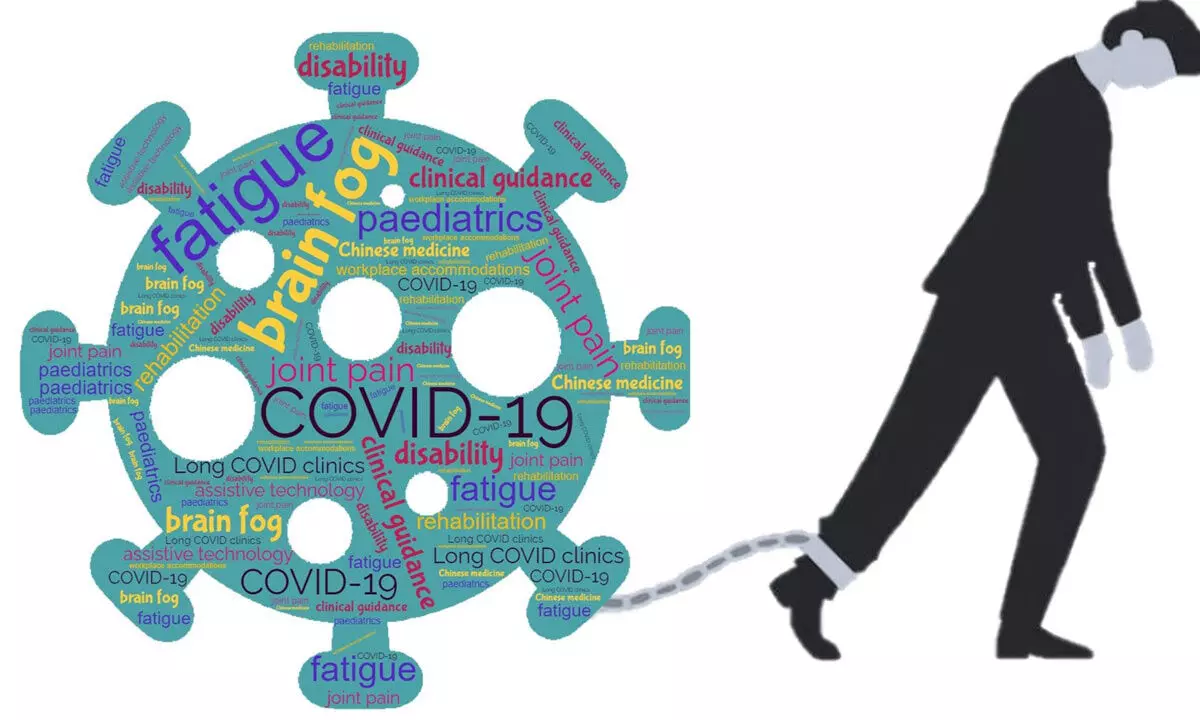Persistent threats from Covid-19

Long Covid patients are at a higher risk for digestive diseases, for up to one year
Geneva: Public health risks resulting from the Covid-19 virus remain high globally, with the virus circulating in all countries, a senior expert from the World Health Organization (WHO) said here.
According to estimates based on wastewater analysis, the actual circulation of Covid-19 is two to 19 times higher than the number of reported cases, Maria van Kerkhove, the interim director of WHO responsible for epidemic and pandemic preparedness and prevention, told a special briefing in Geneva. She also expressed concerns regarding the emergence of post-Covid conditions (also called "long Covid") affecting multiple organs. While there has been a drastic reduction in Covid-related deaths since the peak, around 10,000 deaths per month are still reported from 50 countries. Van Kerkhove expressed concerns about the evolving nature of the virus, with the Covid-19 JN.1 variant representing around 57 percent of global sequences analysed by the WHO.
Symptoms that cause concern
Defined by specific criteria, including symptoms like severe fatigue, lung impairments, neurologic issues, and cardiac impairments persisting for four to 12 months or longer after the acute phase of the disease, the post-Covid condition is a matter of concern, she said. Estimates suggest that one in ten infections could lead to post-Covid conditions, including severe cases. "No treatments are available yet because it's still so new," van Kerkhove said. "There is insufficient attention and funding dedicated to this area," she added. She also warned of the rapid increase in the number of influenza infections in the northern hemisphere, with influenza positivity standing at around 20-21 per cent in week 51 of 2023.
The expert also emphasized the need for simultaneous flu and Covid-19 vaccination to mitigate the burden on healthcare systems. She also called for more booster vaccination, which is at a low level globally, with only 55 per cent of older adults (over 75 or 80) having received a dose. By the end of December 2023, more than 7 million people had been reported to the WHO as having died from Covid-19.
Long Covid patients are at a higher risk for digestive diseases, for up to one year, according to a study. The study, published in the journal BMC Medicine, showed that people who suffered both severe and mild Covid-19 infections suffered from digestive diseases like gastrointestinal (GI) dysfunction, peptic ulcers, gastroesophageal reflux disease (GERD), gallbladder disease, nonalcoholic liver disease, and pancreatic disease. “Our study provides insights into the association between Covid-19 and the long-term risk of digestive system disorders. Covid-19 patients are at a higher risk of developing digestive diseases,” said the researchers in the paper.
“The risks exhibited a stepwise escalation with the severity of Covid-19, were noted in cases of reinfection, and persisted even after 1-year follow-up. This highlights the need to understand the varying risks of digestive outcomes in Covid-19 patients over time, particularly those who experienced reinfection, and develop appropriate follow-up strategies,” they added.
In the study, the team from Southern Medical University in China and University of California Los Angeles, US, compared rates of digestive diseases among Covid survivors 30 or more days after infection (112,311), a contemporary comparison group (359,671), and a pre-Covid group (370,979) in the UK. Participants were adults aged 37 to 73, and Covid-19 survivors were infected from January 2020 to October 2022. The contemporary group was made up of people who lived at the same time as recruitment of the Covid-19 group, and the historical group was made up of uninfected participants with data from January 2017 to October 2019.
Relative to the contemporary group, elevated risk in Covid-19 survivors was 38 per cent for GI dysfunction, 23 per cent for peptic ulcers, 41 per cent for GERD, 21 per cent for gallbladder disease, 35 per cent for severe liver disease, 27 per cent for nonalcoholic liver disease, and 36 per cent for pancreatic disease.
The risk of GERD rose stepwise with Covid-19 severity, and the risk of GERD and GI dysfunction persisted 1 year after diagnosis. Reinfected participants had a higher likelihood of having pancreatic disease. This underscores the significance of ensuring that healthcare systems are equipped to provide appropriate care to this population of mild cases, as well as varying degrees of Covid severity.
Covid can infect brain neurons
SARS-CoV-2 virus that causes Covid-19 can infect dopamine neurons in the brain and trigger senescence – when a cell loses the ability to grow and divide, according to a new study. The findings, published in Cell Stem Cell, suggest that further research on this finding may shed light on the neurological symptoms associated with long Covid, such as brain fog, lethargy, and depression.
The study showed that dopamine neurons infected with SARS-CoV-2 stop working and send out chemical signals that cause inflammation. Normally, these neurons produce dopamine, a neurotransmitter that plays a role in feelings of pleasure, motivation, memory, sleep, and movement. Damage to these neurons is also connected to Parkinson's disease. "This project started out to investigate how various types of cells in different organs respond to SARS-CoV-2 infection. We tested lung cells, heart cells, pancreatic beta cells, but the senescence pathway is only activated in dopamine neurons," said Dr Shuibing C hen, director of the Center for Genomic Health, at Weill Cornell Medicine. "This was a completely unexpected result."
While the clinical relevance of these findings is still unclear, since dopamine neuron senescence is a hallmark of Parkinson's disease, the researchers suggest that long Covid patients should be monitored for an increased risk of developing Parkinson's-related symptoms. To date, Parkinson's symptoms have not been overly reported in population studies.
Vaccination against SARS-CoV-2, the virus that causes Covid-19, provides moderate protection against long Covid, which can cause long-term serious acute illness, in children and adolescents, according to a study. Vaccination also has a stronger effect in adolescents, who have a higher risk of developing long Covid than young children, said researchers from 17 health systems in the US, in work led by investigators at the Children’s Hospital of Philadelphia (CHOP) in Pennsylvania, US.
Long Covid signs vary widely
While overall severity of Covid has been lower in children than adults, the burden of long Covid has been difficult to accurately describe since the symptoms can vary widely and the exact ways the virus causes them are unknown. Some symptoms include brain fog, dyspnoea, gastrointestinal dysfunction, generalised pain and fatigue, while others are more acute, like inflammatory reaction or heart problems. “To date, no studies have assessed clinical data for large, diverse groups of children to address this important question,” said lead author Hanieh Razzaghi, from CHOP.
The incidence of probable long Covid was 4.5 per cent among patients with Covid, though only 0.7 per cent of patients were clinically diagnosed with long Covid. The study estimated effectiveness of the vaccine within 12 months of administration as 35.4 per cent against probable long Covid and 41.7 per cent against diagnosed long Covid. The estimate was higher in adolescents compared with younger children (50.3 per cent vs. 23.8 per cent), and higher at six months (61.4 per cent) but decreased to 10.6 per cent at 18 months. Children who were vaccinated after recovering from Covid also appeared to benefit, with vaccine effectiveness of 46 per cent against probable long Covid after a subsequent episode of Covid.
“This study provides us with important data showing the protective effects of the vaccine against long-haul Covid and suggests that this protection is mostly from preventing visible infections. We hope this means that as vaccines are improved to be more effective against current strains of SARS-CoV-2, their protection against long Covid will get better, too,” said Charles Bailey, Associate Professor of Pediatrics at CHOP.
















